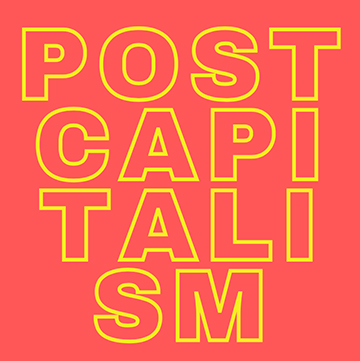I have discussed Inventing the Future before—a theoretical effort by Nick Srnicek and Alex Williams, Left Wing authors, with a straightforward, pragmatic purpose: The authors believe the Left must reorganize and revitalize itself around a new platform defined by a set of coherent demands. The central demand they envision is the universal call for a “post-work world.” They note that this goal is exceptionally powerful because it singularly changes the entire web of Capitalist relations:
Such a project demands a subjective transformation in the process – it potentiates the conditions for a broader transformation from the selfish individuals formed by capitalism to communal and creative forms of social expression liberated by the end of work. Humanity has for too long been shaped by capitalist impulses, and a post-work world portends a future in which these constraints have been significantly loosened. This does not mean that a post-work society would simply be a realm of play. Rather, in such a society, the labour that remains will no longer be imposed upon us by an external force – by an employer or by the imperatives of survival. Work will become driven by our own desires, instead of by demands from outside. Against the austerity of conservative forces, and the austere life promised by anti-modernists, the demand for a post-work world revels in the liberation of desire, abundance and freedom.
The authors propose that the Left must consciously construct a “counter hegemonic” project to replace the current hegemony of Neoliberalism. They note that Neoliberalism was intentionally engineered as an economic and ideological project. This started in the 1940s when the Austrian economist Friedrich Hayek founded the Mont Pelerin Society, bringing together economists from different related schools of thought, in a series of private conferences to define the new mission:
“Neoliberalism was never a given, never a necessary endpoint of capitalist accumulation,” write Srnicek and Willams. “Rather, it was a political project from the beginning, and a massively successful one in the end. It succeeded by skilfully constructing an ideology and the infrastructure to support it, and by operating in a non-folk-political manner.”
I am not as much a student of economics as I would like. I haven’t studied Adam Smith, John Maynard Keanes, Friedrich Hayek, and so on. To be honest, I find economics difficult to focus on and annoying / confusing. When I seek to understand Hayek—the son of Austrian aristocrats who lost a good deal of their fortune in the Depression—I turn to videos such as this one from The School of Life. Apparently, Hayek believed “liberty” was a direct result of market competition, and governments should not seek to influence free markets. He was against central planning of all sorts, declaring it “the road to serfdom.” He had no ideological opposition to Dictators as long as they didn’t try to control the market. His work was a major influence on Thatcher and Reagan, who reduced taxes for the wealthy and social services, based on “supply side economics.”
Hayek’s ideas about limiting monetary supply also seem to have inspired Satoshi Nakamoto, the mythically mysterious inventor(s) of Bitcoin. As this recent discussionbetween Saifedean Ammous, a crypto enthusiast, and Jordan Peterson makes clear, Bitcoin is the pure reification of Libertarian, Anarcho-capitalist, economic ideals. I recommend David Golumbia’s short book, The Politics of Bitcoin: Software as Right Wing Extremism, for context.
I intend to explore the current cryptocurrency situation in more depth, in an upcoming essay. So far, at least, Bitcoin and other cryptocurrencies have not demonstrated any positive social value, while “proof of work” mining continues to be ecologically destructive, not just in terms of the energy consumed but in terms of the raw minerals and materials required to build the massive server farms solving the equations. But more on this later.
 A Bitcoin server farm.
A Bitcoin server farm.“How will we train Americans for the jobs of the future?” or “How will we overcome polarization and bring Americans together?” I’ve been asked these questions innumerable times over the past several years. The honest answers are “We probably won’t. It will almost certainly get worse.” I then talk bravely about the caring economy, vocational programs, changing the language of politics, or circumscribing social media. But none of those things will actually happen. By talking about them as if they were possible, I’m giving people a mistaken sense of reassurance. We have become a whole network of people bullshitting each other into believing that smart people are thinking about it and good things are happening that will address the problems. And then we all just go back to whatever we were doing. …
The mistrust that is building up in American life is born in large part of the pervasiveness of constructive institutionalism. We have conversations about what we can do better while the reality degrades around us, increasing the divergence between the world we’re talking about and the world as it is. We’re paid to be positive and market-friendly and can-do. We say something like “We must solve these problems” while counting our book royalties.
Partly due to Yang planting the idea into the mainstream, UBI is gaining traction remarkably quickly. Dozens of mayors now support pilot programs around the US. The results from a pilot program in Stockdale, California, were extremely successful, according to this article from PBS: “After getting $500 per month for two years without rules on how to spend it, 125 people in California paid off debt, got full-time jobs and had “statistically significant improvements” in emotional health, according to a study released Wednesday.”
Yang is currently building a new political party, Forward, which you can join without abandoning other affiliations. Along with UBI, he has identified ranked choice voting as a change in democratic decision-making that can be made on a state level with positively transformative effects. I think it is worth checking out and joining Forward. Srinicek and Williams believe that to develop a “counter hegemonic” project we will need an ecosystem of institutions and organizations all working in different ways toward the same goals, some more mainstream and some more radical. Forward can be a good mainstream ally of a Leftist resurgence.
It is a massive effort to research and write articles like this one. Paid subscriptions are the support that allows Daniel to continue this work. If you find this valuable, please subscribe to his Substack here.
© 2021 Daniel Pinchbeck.
– Come Like Us on Facebook – Check us out on Instagram –
– Sign Up for our Newsletter –














